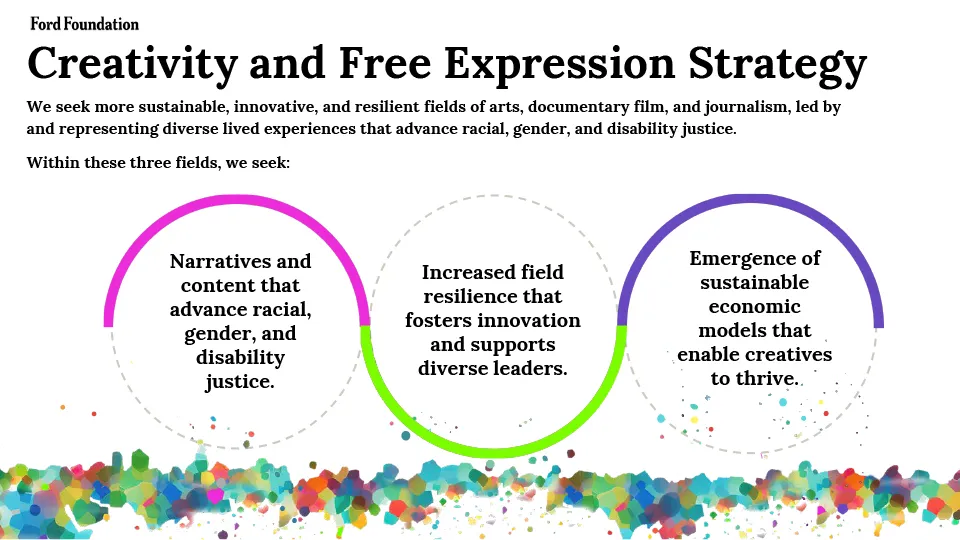U.S. and International Strategy
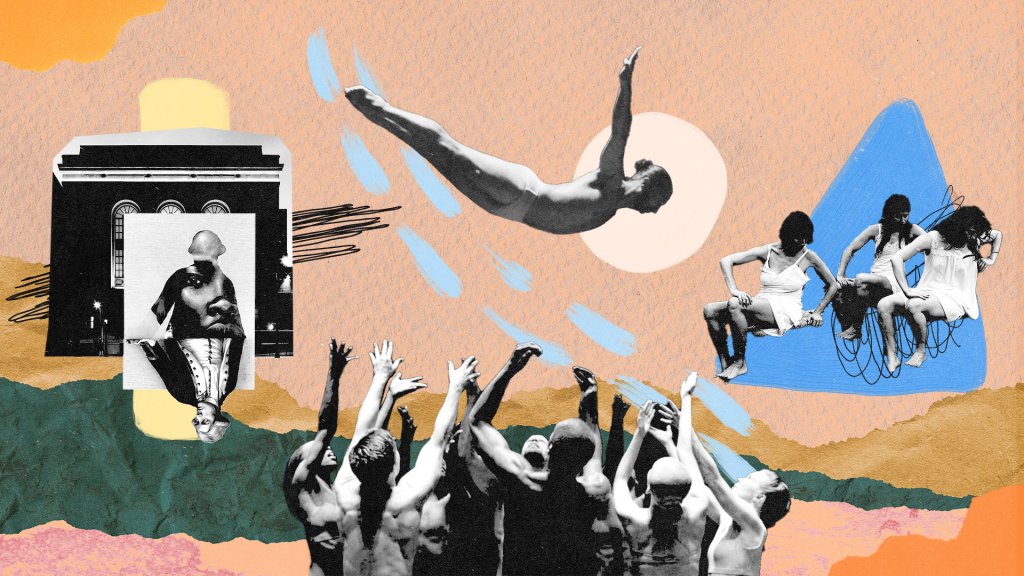
Creative expression has the ability to shape cultural narratives, expose injustice, and build cultural power and belonging for both the creator and the audience. Our work in Creativity and Free Expression supports artists, journalists, filmmakers, and other creatives around the world who have singular artistry and voice and whose work sparks dialogues that support racial, gender, and disability justice. We explore how cultural narratives influence contemporary reality and how these expressive forms can amplify the voices of marginalized communities, broaden understanding of how inequality operates in the world, and expand public imagination for what a more inclusive world can look like. We seek to catalyze a future where creatives are an abundant and sustained presence in all societies, free to spark compelling, propulsive dialogues about the complex world around us.
The Challenge
Today, artists, journalists, and filmmakers face many intersecting challenges that disrupt the sustainability of their practices. These include: threats to freedom of expression; deep field inequalities related to gender, race, and disability; volatile business models; tidal shifts in technology; social polarization; and corporate consolidation.
Artists from underrecognized communities remain the least represented and financed, and they are most prone to economic and political marginalization. For example, filmmakers who are Black, Indigenous, and people of color (BIPOC) in the United States are the least represented among credited directors, and over 95% of characters with disabilities on television are played by able-bodied actors. Artists and journalists also often face economic precarity due to their disproportionately high likelihood of freelance and gig-economy employment and limited social safety nets.
Since the beginning of the COVID-19 pandemic, their jobs have continued to be cut in record numbers, and many of the job opportunities that remain are controlled by an ever-consolidating number of media companies; six companies control 90% of U.S. media, and even fewer entertainment companies dominate streaming entertainment services. This concentration of resources, amidst rising social polarization and technology-fueled misinformation, contributes to the prevalence of one-dimensional, harmful narratives that drive division and perpetuate inequality.
Artists, journalists, and filmmakers of distinct vision who foster dialogues that support social justice must be supported in their work. Without them, harmful and limited narratives claim more space across culture and continue to catalyze discrimination and oppression in the form of racism, misogyny, transphobia, and ableism around the world.
The Opportunity
Culture remains a vital space where belief systems and values are shaped and expanded. And in a nation deeply polarized around race, identity, ideology, and gender, and with widening inequality, culture has an urgent role to play in protecting, bridging, healing, and challenging perspectives.
As demographics in the US shift and the country moves toward having a majority of people of color by 2045, there is greater demand for art, journalism, and films that are truly representative of the nation. Simultaneously, some of the most exciting and powerful examples of storytelling are being created by individuals who have long been overlooked by mainstream culture and society, and we join a field eager to reconsider how to elevate them in ways that include support for groundbreaking exhibitions, fellowships that support artists and journalists that have not been traditionally resourced, and field service organizations that support broader BIPOC field infrastructure.
In a moment of transition and reconsideration for many creative industries, we see an opportunity to rethink the fundamental ways in which artists and journalists are supported economically and rethink the systems that have underserved them. We look to convene critical players to uplift new models of leadership and governance for organizations to better support creatives, as well as fund equitable policies and practices that forecast their long-term resilience and sustainability. We see an opportunity to braid the relations of creative communities, civil society, government, and the private sector to build a future that benefits all artists, journalists, and filmmakers—especially those from underrepresented communities—and frees them from economic precarity.
Our Aim and Approach
Our Creativity and Free Expression program unites our efforts to harness the power of the arts, media, and documentary filmmaking to shape perceptions, values, and belief systems and deepen society’s understanding of the world around us.
We help creatives who have been historically underrepresented by both society and arts and culture industries thrive in order to create meaningful, widely recognized work. Because we believe that these artists, storytellers, and filmmakers must have the resources to tell their stories from their perspectives and experiences, we strengthen organizations, leaders, and networks that support and value them and encourage new models for organizational governance and business practices. We focus on:
The Arts
We support national arts and cultural organizations and networks to advance art and stories created by, told by, and grounded in communities of color and disability—and support organizations led by BIPOC, women, gender-diverse, and disabled individuals.
Journalism
We fund media organizations by and for underrepresented groups, including people of color, Indigenous communities, rural white Americans, and people with disabilities, as well as thought leadership on media equity and sustainability.
Documentary filmmaking
Our global initiative JustFilms supports filmmakers, organizations, and networks that amplify voices and illuminate perspectives often ignored, overlooked, or silenced by culture, including people of color in the United States and the Global South.
Our Impact
We have spent the past 80 years funding innovators in the arts and free expression, including helping to forge storied nonprofit regional theaters such as the Roundabout Theatre Company and public media entities such as PBS. We have also supported pioneering individual artists including James Baldwin, Ping Chong, and Sandra Cisneros and invested in culturally resonant, award-winning documentary productions such as Eyes on the Prize and Citizenfour. Additionally, we have supported Futuro Media Group, founded and led by Pulitzer Prize winning journalist, Maria Hinojosa.
Today, we are building on this legacy to create more sustainable, innovative, and resilient fields of arts, journalism, and documentary film led by and representing diverse lived experiences that advance racial, gender, and disability justice. We work toward three critical and interconnected outcomes:
Cultural narratives will reflect the diversity of their communities.
Through widely representative cultural works that reflect inclusive lived experiences, arts, documentary film, and journalism content will advance racial, gender, and disability justice.
Field ecosystems are resilient and thriving.
The organizations supporting the arts, documentary film and journalism have stability and longevity through innovations in institutional governance, diverse leadership, and the ability to harness technology for good while minimizing its harms.
Creative independence is sustainable.
The fields of arts, documentary film, and journalism will develop new, inclusive economic models that decrease dependence on donors and commercial interests.
Portfolio Snapshot
Annual Budget$28 million
Build Budget$8 million
Where this work is happening
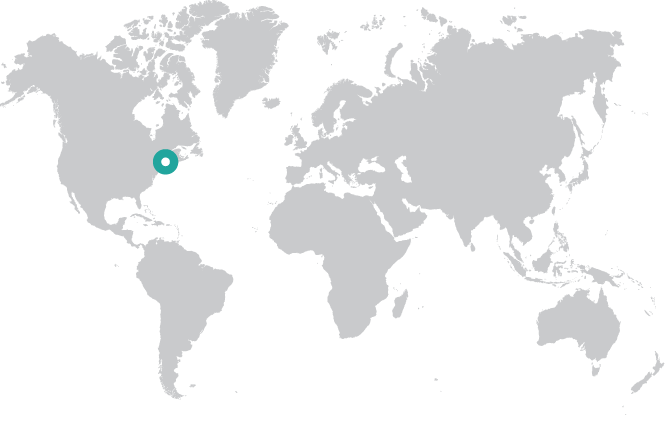
Number of grantees193
Grantee Snapshot
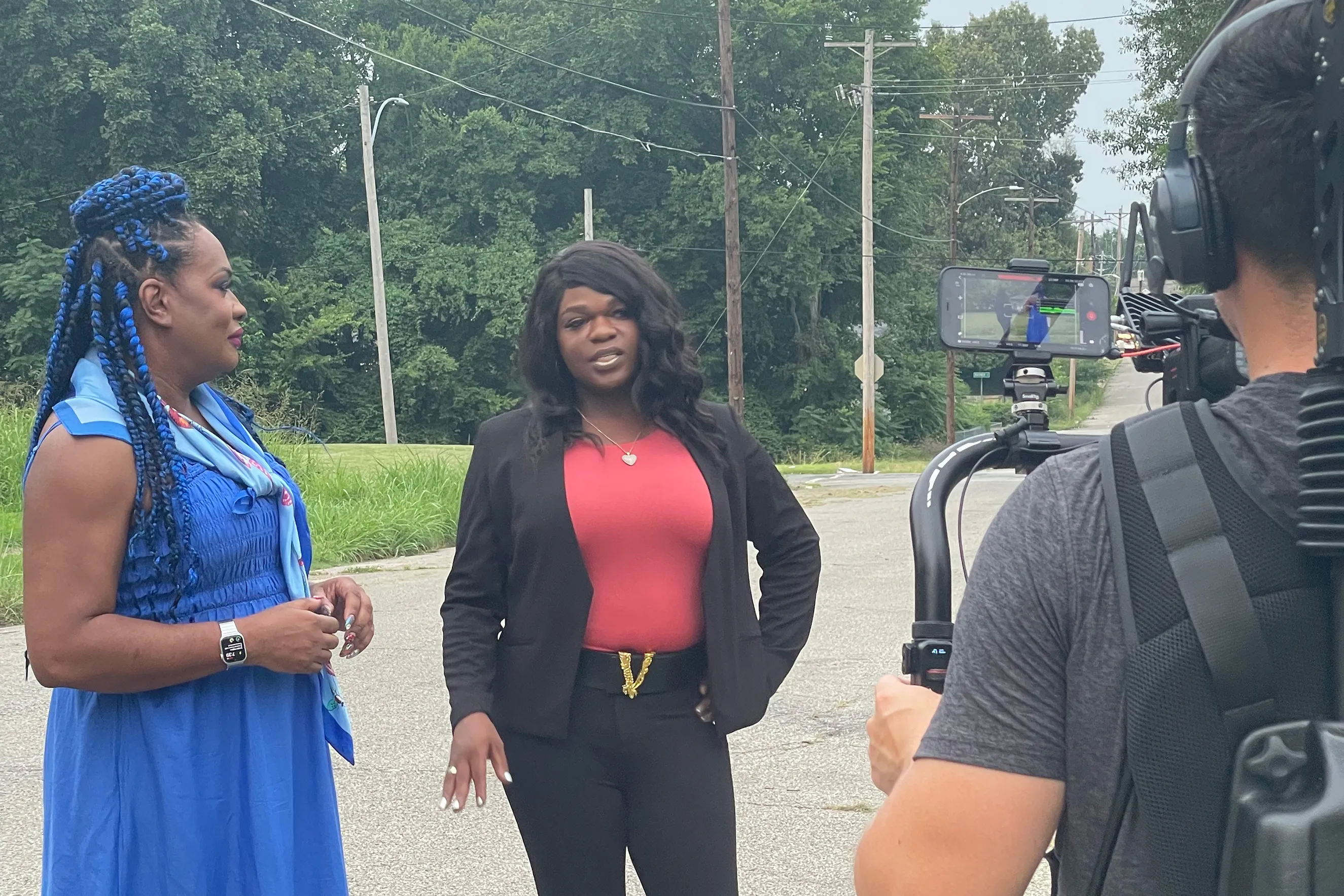
TransLash is a nonprofit multimedia organization that uses the power of journalism and personal storytelling to embed new narratives of transgender people, especially those of color, into public consciousness. Its overarching goal is to help decrease cultural hostility towards members of the transgender community—the most marginalized of the marginalized—to save lives and protect democracy. TransLash is led by Imara Jones, a multiple award-winning journalist and Black trans woman, and its team is comprised of nearly 20 journalists and content creators who reflect the diversity of the trans community and the United States.
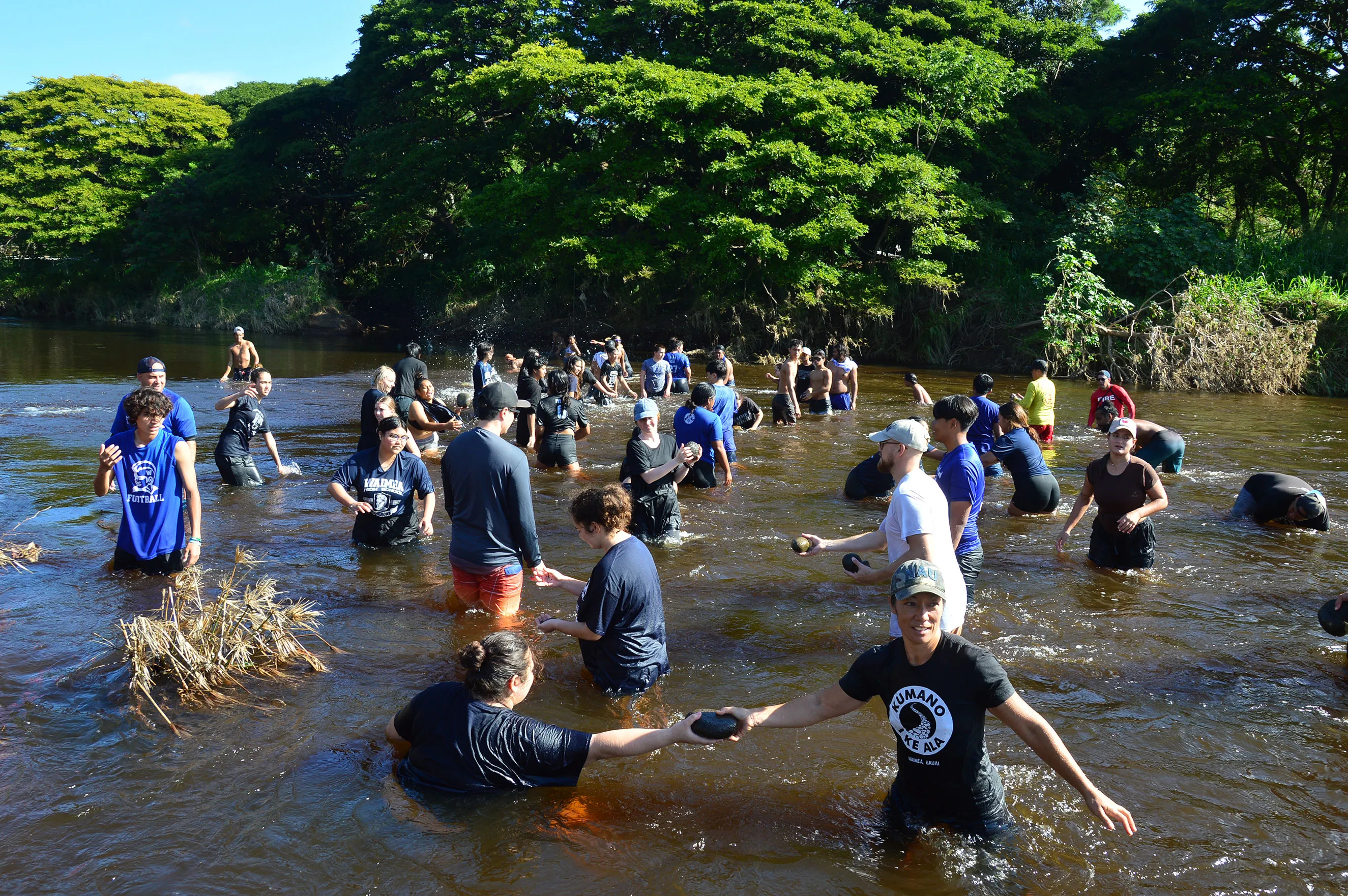
Kumano I Ke Ala (KIKA) is a community-based organization located in West Kaua‘i, Hawai’i, that works at the intersection of youth education, cultural preservation, workforce training, and food sovereignty. Through support of the arts, KIKA encourages new economic models that have strong potential for reimagining and building community resilience as a form of economic and cultural justice. The organization supports communities in West Kaua‘i as custodians of the land and bearers of Indigenous culture, knowledge, and foodways. By revitalizing traditional agricultural practices and food systems, this kind of restoration mobilizes local culture, youth, farming, and community advocates to engage in community development, linking Hawai’i’s past with its present.
